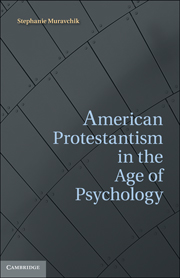Book contents
PART ONE - THERAPY AS MINISTRY IN CLINICAL PASTORAL EDUCATION
Published online by Cambridge University Press: 05 July 2011
Summary
Introduction
A rift between Protestantism and psychology emerged from the scandals surrounding the Emmanuel Church movement and the demise of the psychology-of-religion movement in the 1920s. Had no one waded into the breach, the topography might quickly have come to resemble the chasm that opened between Protestantism and Darwinian theory in the same period after half a century of comfortable coexistence. Vitriolic and permanently divisive fights erupted in the 1920s as an atheistic emphasis on randomness replaced a religiously palatable teleological spin to evolution. After the Scopes trial, religious interpretations of historical biological change were permanently discredited among many educated Americans. A potential for similar ruptures in other fields, especially psychology, loomed.
Sensing danger, an unusual polymath named Helen Flanders Dunbar – medical doctor, scholar of theology and philosophy, and expert in psychosomatic medicine – warned in 1930:
[If] the priest who is coming to be suspect and ostracized from increasingly large social groups…is to be restored to his place in a populace which has imbibed deeply the scientific method, he must drink at the same well.
Dunbar was eager to show clergy the way. The same year she issued her warning, she became the first director of a pioneering organization devoted to training Protestant clergymen in clinical psychology. Her group called itself the Council for the Clinical Training of Theology Students. Similar groups devoted to the same sort of pedagogy were soon formed.
- Type
- Chapter
- Information
- American Protestantism in the Age of Psychology , pp. 25 - 27Publisher: Cambridge University PressPrint publication year: 2011



